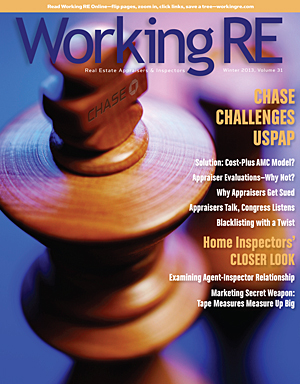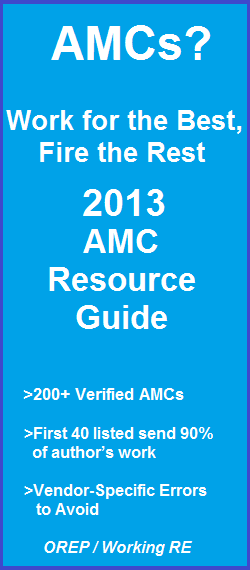
|
Published by OREP, E&O Insurance Experts | Feb. 27, 2013 | Vol. 272 |
"While the new regulations
aren't too different from the old, they do place every
appraiser square in the bull's eye of lawsuits. If you’re not aware of this, hang
on, this may hurt a bit."
Fed Says: High Quality Appraisals or Else
by Richard Hagar, SRA
In January the Consumer Financial Protection Bureau (CFPB) issued a new set of
regulations relating to appraisals.
While the new regulations aren't too different from the old, they do place every
appraiser square in the bull's eye of lawsuits. If you’re not aware of this, hang
on, this may hurt a bit.
New Regulations
• Require creditors (lenders) to notify applicants (borrowers) of their right to
receive a copy of appraisal within three business days of receiving a loan
application.
• Require creditors (lenders) to provide applicants a copy of
each
appraisal, and other written valuation, promptly upon completion or three
business days
before
consummation or account opening, whichever is earlier.
• Prohibit creditors from charging for a copy of an appraisal and other written valuations, but permit creditors to charge applicants reasonable fees for the cost of the appraisals or other written valuation.
What Does this Mean for Appraisers?
a. Copies of the appraisal will be given to the borrower before they close on a
loan (purchase or
refinance).
b. Since the borrower has a copy of the appraisal
before closing
they can, and may, rely on the
appraisal information to “help” them make their purchase or borrowing decision.
c. If at a later date someone believes (doesn’t have to prove) that the
appraisal is of poor
quality and “misled” the borrower/buyer-
get ready for it,
the borrower has a very solid legal foundation to sue the appraiser for poor
performance.
d. The “form filling” appraisers who slap together a couple appraisals a day
using poorly researched information and no support for their adjustments, are
going to get sued often and get forced out of the business.
e. The appraiser’s time and cost of doing business just increased.
Appraisers often tell me that their work is “just fine.”
They say, “Banks accept it. It must be
OK so I’m not worried.” Really! That’s your measure of good work- the bank
accepted it? Would those be the same banks that are paying billions in fines due
to accepting poor quality appraisals!? Are you really hanging your hat, and
career, on what an unlicensed underwriter from Pakistan thinks?
As an expert witness, I review a lot of appraisals, most of which should never
have been relied upon by a lender. Years after the fact, appraisers are being
sued for poor performance. As a consultant, I’m asked by the appraiser’s
attorney to review the appraiser’s work. In
many cases I’m not able to say that the appraisal and workfile are “up to a
competent appraiser’s standard of care.” In these cases, it’s almost impossible
for the attorney to mount a defense against these lawsuits- due to appraisers
not keeping information in their workfile, such as proper support for
adjustments, combined with their use of really bad comparables.
In the end, many appraisers lose these suits and they lose BIG. With a lawsuit
loss, the appraiser is placed on a “blacklist” by the lender and becomes forced
to accept low-paying appraisal orders or is put out of business altogether.
What Can An Appraiser Do?
1. Assume one day in your future I’ll be personally looking at your appraisal
and your workfile. I’ll use a microscope and look everywhere. How comfortable
will you be?
2. Do
not
assume
your appraisals meet the “competent appraiser’s standard of care.” On the
contrary, assume they are a failure. This doesn’t mean they are, but it’s this
assumption that should keep you up at night, and even better, push you toward
producing higher quality appraisals.
3. Pull several local appraisers together and form a larger office. The more
appraisers interact, the better their product.
4. Join an appraisal association like the Appraisal Institute, NAIFA or NAR or
at least join your local appraisal coalition.
5. Take the best education you can find. Not the cheapest but the very best.
This is key to your survival.
6. Make sure the instructors are great. Good education costs more but what you
will learn when taking
live education and talking to other appraisers about the issues may save you
from a fatal lawsuit.
7. Produce a better appraisal, then increase your fees. Drop low paying clients. Your income will increase!
Buyers are going to be reading your appraisals. If anything goes wrong in their
lives, they are going to make your life hell. The quality of appraisals must
increase or appraisers face being sued out of business.
Hagar's Upcoming Webinar:
Appraisal Review and the Law
>
Click to Print
this Article
ATTENTION: You are receiving WRE Online News because you opted in at WorkingRE.com or purchased E&O insurance from OREP. WRE Online News Edition provides news-oriented content twice a month. The content for WRE Special Offer Editions is provided by paid sponsors. If you no longer wish to receive these emails from Working RE, please use the link found at the bottom of this newsletter to be removed from our mailing list.




